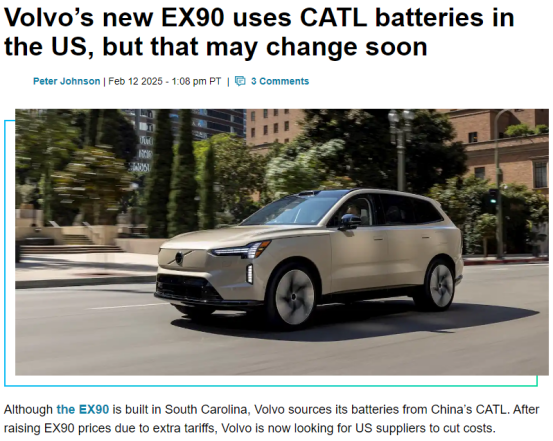Volvo Eyes U.S. Battery Suppliers to Replace CATL Amid Tariff Pressures
Published: February 18, 2025 18:24
According to Electrek's February 12 report, Volvo's new EX90 currently uses CATL batteries in the U.S. market, but this arrangement may soon change.
Following Trump's planned additional tariffs on Chinese imports, Volvo raised the EX90's price and is now actively seeking U.S.-based battery suppliers to reduce costs. The EX90, Volvo's first premium seven-seat electric SUV manufactured at their Charleston, South Carolina facility, initially launched at $77,990. However, Volvo implemented a $3,300 price increase before the vehicles reached dealerships.
While Volvo spokesperson Sophia Durr attributed the price hike to rising material costs, CEO Jim Rowan revealed during last week's corporate media call that "additional tariffs" have eroded the EX90's profit margins. "We're exploring potential partnerships with local battery manufacturers in the U.S. to help minimize these costs," Rowan added.

source: Electrek
Electrek suggests that Volvo has several domestic battery sourcing options. Among the global battery leaders competing for contracts is SK On, which already supplies Volkswagen, Ford, and Hyundai. The publication specifically highlighted SK On's Commerce, Georgia facility, which has the capacity to supply approximately 300,000 electric vehicles annually.
Since taking office, Trump has introduced several policies impacting the EV industry, including:
· Discontinuing EV support policies
· Planning to eliminate EV tax credits and subsidies
· Imposing 10% tariffs on Chinese imports
· Adding 25% tariffs on Canadian and Mexican imports
These measures have created uncertainty among automotive manufacturers and Asian battery producers with significant U.S. investments. LG Energy Solution, Korea's leading battery manufacturer, announced in January a 20-30% reduction in this year's capital expenditure to address the EV industry's uncertain outlook.

source: Volvo
Earlier this month, Ford CEO Jim Farley was candid about the potential impact of Trump's 25% tariff on Canadian and Mexican imports: "Undoubtedly, a prolonged 25% tariff on Canadian and Mexican imports would devastate our industry, eliminating billions in industry profits and negatively impacting U.S. employment," he stated during the company's Q4 earnings call on February 6.
Addressing these concerns at Tuesday's Wolfe Research investment conference, Farley indicated that Ford is developing strategies to build U.S. inventory to mitigate the impact of Trump's tariffs.
However, Trump's policy positions remain fluid. On February 13, he announced plans for "reciprocal tariffs," matching rates with trading partners, and suggested potential tariffs on countries using value-added tax systems.
These policy uncertainties are expected to present significant challenges for the global EV industry's development in the near term.
